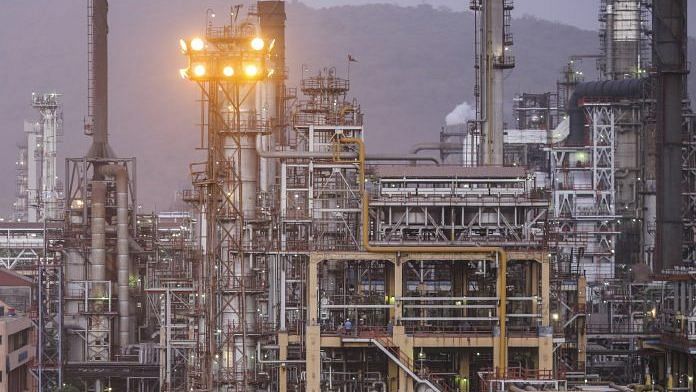New Delhi: The Narendra Modi government, which in its earlier term had proposed the merger of public sector oil companies, has decided to abort the idea amid an increase in oil imports and reduced domestic production.
Sources said there will be no mergers of oil PSUs in the immediate future after the marriage between the Oil and Natural Gas Corp (ONGC) and Hindustan Petroleum Corporation Ltd (HPCL) led to multiple problems. In January 2018, ONGC took over HPCL by buying out the entire 51.11 per cent stake that the government held for Rs 36,915 crore.
“The merger proposal has been put in the freezer for now,” a government official told The Print.
“The merger of ONCG and HPCL has not been smooth and at this point with an uncertain international scenario, there is little room for experiments,” the official added.
“With India importing over 80 per cent of its oil needs, the focus now has to be on increasing production and scouting for new suppliers since oil imports from Iran have been halted.”
The government’s earlier push for the mergers even found a mention in the budget speech of then finance minister Arun Jaitley, who on 1 February 2017, announced that some of the oil companies will be merged to form giant firms that could compete with international and domestic players.
The government has, however, gone ahead with the mergers of other PSUs to meet its disinvestment target. Last year over 35 per cent of the disinvestment target was met by selling PSUs to one another.
Also read: RBI to the rescue – Modi govt eyes bank’s Rs 9.6 trillion surplus to beat economy blues
The ONGC-HPCL merger blues
One of the reasons for the decision appears to be the troubles plaguing the ONGC-HPCL merger.
Even after HPCL has become a subsidiary of ONGC, it has refused to accept the latter as its promoter. HPCL has listed the President of India, instead of ONGC, as its promoter with “zero” per cent shareholding in its regulatory filings submitted to the Bombay Stock Exchange for five quarters. ONGC was listed as a “public shareholder” with 51.11 per cent shareholding in the company.
On 17 June, the Public Enterprises Selection Board (PESB) invited Shashi Shanker, chairman and managing director of ONGC to participate in the selection process for HPCL’s new director of finance, reinforcing the fact that ONGC is the parent company. According to The Economic Times HPCL’s chairman and managing director M.K. Surana, who until now used to sit on the interview panels to select directors of the company, was not called.
A former ONGC official added that the company in 2017-18 primarily focused on its acquisition of HPCL. “Acquisition of that scale is not easy and this was almost a diktat from the Centre to go ahead with the merger..so these disrupt the core activities too,” the official added.
Also read: Andhra Bank, SBI, UBI among top PSU banks with over 70% NPA from industry in FY19
India’s oil production drops
Amid rising geopolitical uncertainties and tense US-Iran relations, India’s total crude oil production has been dropping, leading to an increase in imports.
The country’s total crude production was 37.5 million metric tonnes in 2014-15. It has fallen to 34.2 million metric tonnes in 2018-19.
ONGC’s production dropped from 20.8 million metric tonnes in 2017-18 to 19.6 million metric tonnes in 2018-19. A former ONGC official said the oil major has been preoccupied with issues arising after the acquisition of HPCL in the last fiscal.
India’s total crude oil imports have risen from 202.85 MMT in 2015-16 to 226.64 MMT, according to a government website.
Also read: Maharatna & Navratna PSUs are involved in tax disputes worth nearly Rs 17,000 crore
